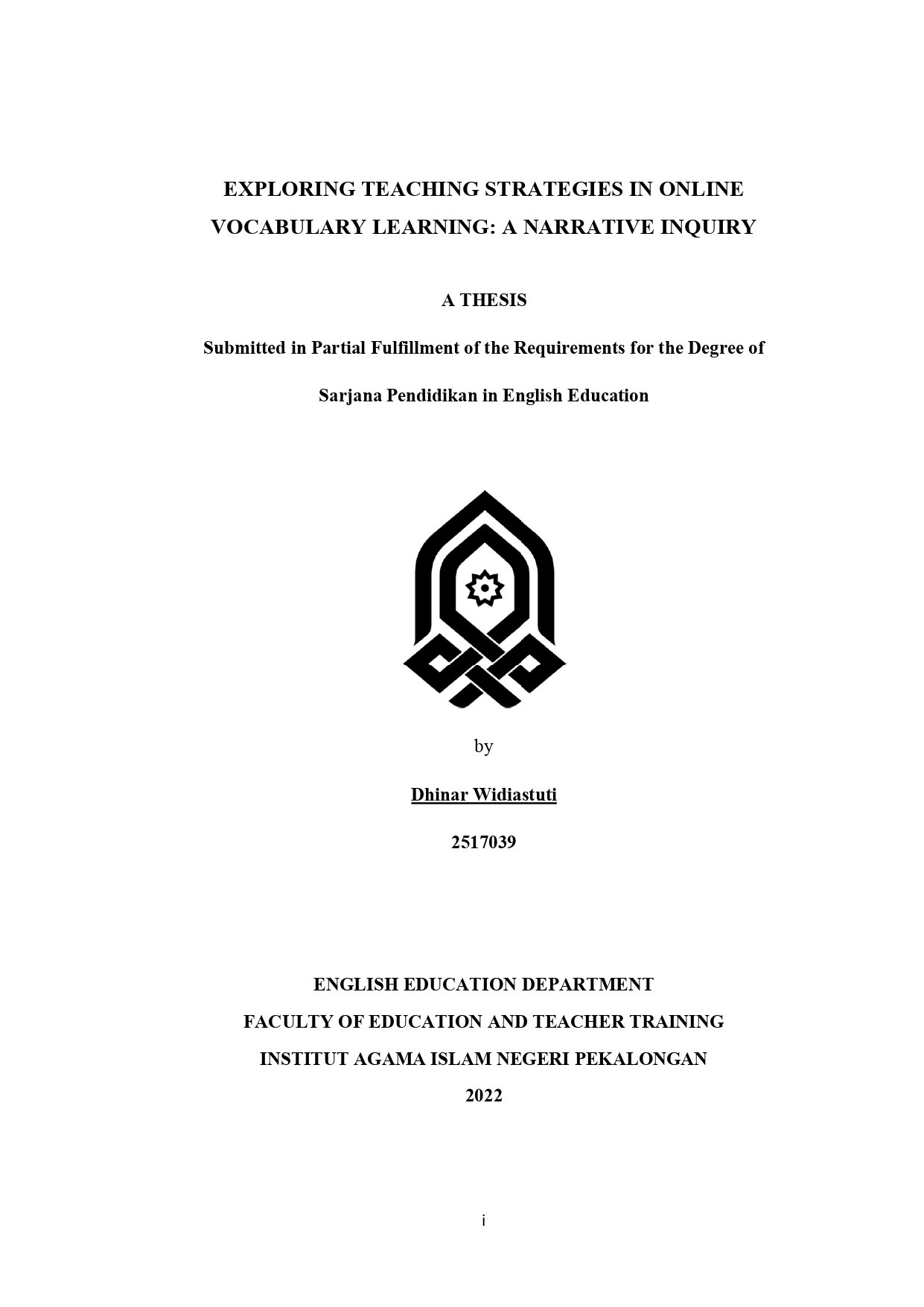
SKRIPSI TADRIS BAHASA INGGRIS
Exploring Teaching Strategies in Online Vocabulary Learning : A Narrative Inquiry
Belajar kosakata bahasa Inggris merupakan hal penting yang harus
dipelajari dan diperhatikan. Oleh karena itu, guru harus memiliki strategi
yang baik dalam mengajarkan kosakata. Di tengah pandemi COVID-19,
seluruh kegiatan belajar mengajar dilakukan di rumah dengan sistem
online untuk mengurangi risiko penularan COVID-19. Oleh karena itu,
guru harus memiliki strategi yang baik agar siswa dapat memahami dan
meningkatkan kosa kata mereka. Penelitian ini bertujuan untuk
mengetahui bagaimana seorang guru mengajar kosakata melakukan
proses pembelajaran dengan menggunakan sistem pembelajaran online.
Penelitian ini menggunakan pendekatan kualitatif. Teknik analisis data
dalam penelitian ini adalah wawancara semi terstruktur. Data dianalisis
dengan menggunakan analisis tematik oleh Braun dan Clarke. Hasil
penelitian ini menunjukkan bahwa guru menggunakan empat strategi
dalam mengajar kosakata selama COVID 19, yaitu menebak kata,
menggunakan game, menghafal, dan menggunakan strategi video. Strategi
ini digunakan untuk pelajar muda untuk mendapatkan kepercayaan diri
dalam menguasai kosakata bahasa Inggris.
Kata Kunci: Strategi Mengajar, Pembelajaran Online, Pandemi COVID-
19
REFERENCES
Alavi, G., &Gilakjani, A. P. (2019). The Effectiveness of Games in Enhancing
Vocabulary Learning among Iranian Third Grade High School Students.
Malaysian Journal of Elt Research
Ahmadi, A. 2005. StrategiBelajarMengajar. Bandung: CV. PustakaSetia
Apriyanti, C. (2020). Distance learning and obstacles during Covid-19 outbreak.
JurnalIlmiahPendidikanDasar, 7(2), 68-83.
Arkorful, Valentina. (2014). The Role of E-Learning. The Advantages and
Disadvantages of its Adoption in Higher Education. International Journal
of Education and Research. Ghana: University of Cape Coast
Arta, K.H. (2018). The Strategies Used By English Teacher To Teach Vocabulary
(A Study At Several MAS in Aceh Besar). A Thesis of English Language
Education Faculty of Education and Teacher Training ArRaniry State
Islamic University Darussalam-Banda Aceh
Bao,W. (2020). COVID‐19 and online teaching in higher education: A case study
of Peking University. Human Behavior and Emerging Technologies, 2 (2),
113-115. https://doi.org/10.1002/hbe2.191
Bozkurt, A., Et Al. (2015). Trends in distance education research: A content
analysis of journals 2009-2013. The International Review of Research in
Open and Distributed Learning, 16(1).
https://doi.org/10.19173/irrodl.v16i1.1953
Bartley, S. J., &Golek, J. H. (2004). Evaluating the cost effectiveness of online
and face-to-face instruction. Educational Journal and Technology.
Bozkurt, A., Et Al. (2015). Trends in distance education research: A content
analysis of journals 2009-2013. The International Review of Research in
Open and Distributed Learning, 16(1).
https://doi.org/10.19173/irrodl.v16i1.1953
Braun V, Clarke V. Using thematic analysis in psychology. Qual. Res. Psych.
2006; 3: 77– 101.
Bušelić, M. (2017). Distance Learning – concepts and contributions. Oeconomica
Jadertina, 2(1). https://doi.org/10.15291/oec.209
Cahyani, DwiMelsa. 2017. Learning English Vocabulary By Using Guessing
Game In The First Semester Of Hotel Accomodation The First Grade
Students Of SMKN 3 Bandar Lampung In 2017/2018 Academic Year.
Faculty Of Education and Teacher Training. State Islamic University
(UIN) RadenIntan Lampung.
Catalan, R. M. J. (2003). Sex differences in L2 vocabulary learning strategies.
International Journal of Applied Linguistics, 13(1), 54-77
Coates, H & Krause, K. (2008). ‘Students’ engagement in first year university’,
Queensland, Australia: Griffith Institute for Higher Education.
Davis, L. N., Gough, M., & Taylor, L. L. (2019) Online teaching: Advantages,
obstacles and tools for getting it right. Journal of Teaching in Travel &
Tourism
Dhawan, S. (2020). Online learning: A Panacea in the time of COVID-19 crisis.
Journal of Educational Technology Systems, 49(1), 5-22.
https://doi.org/10.1177%2F0047239520934018
FitriyaniNur, L. (2014). Using Contextual Redefinition Strategy To Improve
Students' Vocabulary Mastery At Grade VII A of SMP Negeri 1 Giri
Mulya. Univeersity of Bengkulu
Fontana, A., & Frey, J. H. (2008). The interview. From neutral stance to political
involvement. In N. K Denzin & Y. S. Lincoln (Eds.). Collecting and
interpreting qualitative materials (pp. 115-159). Thousand Oaks, CA:
Sage.
Golonka, E. M., Bowles, A. R., Frank, V. M., Richardson, D. L., &Freynik, S.
(2014).Technologies for foreign language learning: A review of
technology types and their effectiveness. Computer Assisted Language
Learning,27(1), 70–105. doi:10.1080/09588221.2012.700315
Hayati, Ai. 2020. The Use of Digital Guessing Game to Improve Students'
Speaking Ability. English Education Program. Faculty at teacher Training
and Education. Galuh University. Journal of English Education and
Teaching
Hidayat D., Anisti, Purwadhi, Wibawa D. (2020). Crisis Management and
Communication Experience in Education during the COVID-19 Pandemic
in Indonesia. Malaysian Journal of Communication. Jilid 36(3): 67-82
Hiebert, Elfrieda H and Kamil, Michael L. (2005). Teaching and Learning
Vocabulary, Bringing Research to Practice. London: Lawrence Erlbaum
Associates
Hiranrithikorn, Phatthanan. (2019). Advantages and Disadvantages of Online
Learning. SuanSunandhaRajabhat University, Bangkok, Thailand
Holmes, B. &Gardner, J. (2006).E-Learning: Concepts and Practice, London:
SAGE Publications.
Ketersediaan
| 23SK2325011.00 | SK TI 23.011 DHI e | My Library (Lantai 3. Local Content) | Tersedia |
Informasi Detail
- Judul Seri
-
-
- No. Panggil
-
SK TI 23.011 DHI e
- Penerbit
- Pekalongan : Jurusan S-1 Tadris Bahasa Inggris FTIK UIN K.H. Abdurrahman Wahid Pekalongan., 2022
- Deskripsi Fisik
-
xiii, 34 hlm., 30 cm; Bibliografi: 35-39
- Bahasa
-
Inggris
- ISBN/ISSN
-
-
- Klasifikasi
-
371. 35
- Tipe Isi
-
-
- Tipe Media
-
-
- Tipe Pembawa
-
-
- Edisi
-
-
- Subjek
- Info Detail Spesifik
-
-
- Pernyataan Tanggungjawab
-
Dhinar Widiastuti (2517039)
Versi lain/terkait
Tidak tersedia versi lain
Lampiran Berkas
Komentar
Anda harus login sebelum memberikan komentar
 Karya Umum
Karya Umum  Filsafat
Filsafat  Agama
Agama  Ilmu-ilmu Sosial
Ilmu-ilmu Sosial  Bahasa
Bahasa  Ilmu-ilmu Murni
Ilmu-ilmu Murni  Ilmu-ilmu Terapan
Ilmu-ilmu Terapan  Kesenian, Hiburan, dan Olahraga
Kesenian, Hiburan, dan Olahraga  Kesusastraan
Kesusastraan  Geografi dan Sejarah
Geografi dan Sejarah